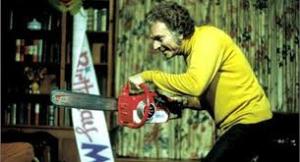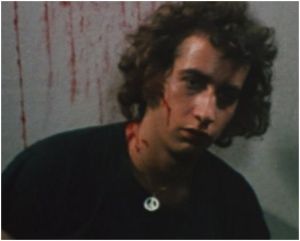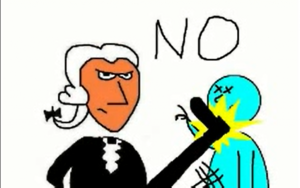IF YOU SPEND enough time watching movies, you’re bound to find a movie or two that, after the movie is over, leaves you wondering “What in the hell is wrong with the people who made this movie?”
One of those movies is The Last House on the Left.
Originally released in 1972 and re-made in 2009, The Last House On the Left is a loosely-based exploitation ripoff adaptation of Swedish director Ingmar Bergman’s 1960 film The Virgin Spring.
Based on an a Swedish folktale, The Virgin Spring depicts a father’s revenge against the men who rape and murder his young daughter.

One of the United Kingdom’s infamous “video nasties”, The Last House on the Left, along with Reggero Deodato’s rape-revenge flick, House on the Edge of the Park, the rape-revenge themed I Spit on Your Grave (not to be mistaken with I Eat Your Skin, I Eat Your Corpse, or I Hate Your Guts, which, for those who are curious about that film’s plot, is about a trio of racists who terrorize a black family), and the rape-vigilante revenge themed Death Wish, Wes Craven’s The Last House On the Left was among the early 1970’s cinematic progenitors of grindhouse exploitation flicks and reprehensible cinema.
Whereas many exploitation films are completely devoid of significance beyond a few boobie shots and gratuitous violence, The Last House On the Left is unique in that the film not only succeeds as one of 70’s cinema’s finest examples of an exploitation flick done well, the film is also philosophically intriguing in its probing on the nature of violence and the ethics of revenge.
In Bergman’s The Virgin Spring and in Craven’s The Last House On the Left a naïve young maiden and her traveling companion encounter a trio of criminals who rape and murder the young woman (and in The Last House On the Left the young woman’s traveling companion).
The trio arrive at the home of the maiden, where they are given shelter by the young woman’s parents. When the parents of the young woman discover that their daughter has been murdered by their trio, the parents take revenge against their murderous guests.
In The Last House On the Left, the young maiden is 17 year-old Mari Collingwood. Mari and her (older and worldly) friend Phyllis, are headed to a rock concert by the aptly named Bloodlust when Phyllis suggests that the pair score some marijuana before heading to the show.
The women are lured with the promise of drugs to the lair of escaped murderer Krug Stillo (played by the late David Hess) and his cohorts, Krug’s girlfriend Sadie and Weasel, and Krug’s heroin addicted son, Junior. Krug and his group immediately begin to brutalize the pair, eventually kidnapping the young women and driving them to the woods, where Krug, Sadie, and Weasel humiliate and abuse the young women sexually. Krug forces Phyllis to urinate on herself and carves his name into Mari’s chest. Phyllis, who manages to escape, is tracked down and is stabbed and disemboweled. Mari is raped by Krug and shot.

The killers eventually make their way to a home in the woods that (coincidentally) is the home of the Collingwood family. Mari’s parents, unaware that their unexpected guests are their daughter’s killers, offer Krug and company food and shelter for the night.
It’s not long before the murderous trio discover that the middle-aged couple who offered them food and shelter are Mari Collingwood’s parents. Junior, unable to bear guilt and severe heroin withdrawal, expresses his apprehensions about the murders and the possibility of being found out.
Unfortunately for Krug and his crew, Junior expresses his apprehensions a little too loudly.
Mari’s parents overhear the heated exchange between Junior and Krug’s crew. The couple, devastated by the news of their daughter’s death, devise a plan to exact revenge against Krug and his accomplices. The Collingwoods kill Krug, Sadie, and Weasel (he is dispatched by Mari’s mother, who bites off his penis).
In a final act of brutality, Krug, arguably a prime contender for worst father of the year, persuades his son to commit suicide.
The film ends as Mari’s parents, having exacted their revenge against Krug and his crew, embrace each other; shattered by the depths of brutality to which they have plunged.
Our gut reaction to the brutal murder of Mari and Phyllis may be to side with the parents. It’s more than reasonable to think that any person would want to exact revenge on those who do harm to the people that we love.
We may all agree that Krug and his band of criminals deserve to be punished for what they’ve done. But the notion of punishing someone for a crime isn’t as simple as it may seem. There are important questions we must ask before doling any punishment.
Namely, how much punishment is enough – and, more importantly, who does the punishing?

WEASEL DREAMED THAT HIS PUNISHMENT WOULD GO SOMETHING LIKE THIS. IN REALITY, IT WENT A BIT DIFFERENTLY
Now, if you’re thinking Kant has an theory on this you’re absolutely correct.
Or you’ve read Kant.
CAUTION: KANTIAN PHILOSOPHY AHEAD

Kant tells us that people should be held accountable for what they do and when necessary, the appropriate punishments be given. According to Kant, philosophically correct punishment necessarily requires that: 1) people be punished for the fact that they have committed a crime, and 2) punishments must be proportional to the crime – small punishments for small crimes and big punishments for big crimes.
But then, we already know that.
Of course we believe that people should be punished for committing a crime. And we also believe that heinous crimes deserve stiff (and swift) punishment. But what kind of punishment are we talking about? Do some people who commit a particular kind crime have a particular kind of punishment coming to them?
A punishment like, say, death?
Sure, we sympathize with Mari Collingwood’s parents, but is demanding an eye for an eye the philosophically correct thing to do?
Opponents of the death penalty often claim that death as a method of punishment isn’t justice but an act of revenge. Sir Francis Bacon wrote that revenge is a “kind of wild justice” that puts man “even with his enemy” and has more to do with rage than justice.
On the other hand, supporters of the death penalty argue that justice has nothing to do with revenge or retaliation and to execute someone for a crime such as murder is not an act of vengeance; it is merely returning a harm for a harm. The death penalty is just retribution.

IF WE BELIEVE THAT THE DEATH PENALTY IS MORALLY IMPERMISSIBLE, IS IT OKAY TO BITE OFF A MAN’S PENIS INSTEAD?
JUST SAYIN’
Ok, semantics alert: I realize that the words “revenge” and “retribution” are synonyms.
However, when we speak of getting “revenge”, we’re usually referring to the image of a vigilante, the lone gunman who exacts revenge without regard for the legality of their actions. We think of characters like Charles Bronson in Death Wish, Jodie Foster in The Brave One, Inigo Montoya in The Princess Bride, Alex and Ricky’s “victims” in House On the Edge of the Park, or in movies like The Crow, Kill Bill vol. 1 and Vol.2, and so on.
In the eyes of many people
The death penalty isn’t revenge.
It’s justice.
And according to Kant, justice is all about retribution.
Immanuel Kant tells us that justice should be retributive, that is, if you commit a crime, you get what’s coming to you; what you deserve. Kant’s system of justice is a lot like the maxim of the Roman legal system that for each person the constant and perpetual will to render to each what is his due.
However, Kant also states that punishment must be proportional to the crime committed – if a person commits a minor offense, the punishment ought to be minor and if a person commits a major offense, the punishment ought to fit a major offense. Krug and his comrades kidnapped, terrorized, raped, and murdered two people. According to Kant, it is reasonable, if not morally permissible, to put murderers like Krug Stillo to death.*
Kant states:
But whoever has committed murder, must die. There is, in this case, no judicial substitute or surrogate, that can be given or taken for the satisfaction of justice. There is no likeness or proposition between life, however painful, and death, and therefore there is no equality between the crime of murder and the retaliation of it but what is judicially accomplished by the execution of the criminal…
Kant adds:
A society that is not willing to demand a life of somebody who has taken somebody else’s life is simply immoral.

ACCORDING TO KANT, SLICING A MAN LIMB FROM LIMB WITH A CHAINSAW MAY BE A PERFECTLY REASONABLE METHOD OF ADMINISTERING THE DEATH PENALTY
We can make a compelling moral argument that Kant would not have objected to putting Krug and his fellow murderers to death. However, doing so is not without problems.

Mari Collingwood’s parents messed up.
Although the brutality of Mari’s and Phyllis’ deaths is matched by the brutality with which their murderers are killed, we can still argue that the Collingwood’s revenge retribution is not justice.
Mari’s parents should have allowed the authorities deal with Krug and his gang. We create laws to deal with those who commit violent acts against others. The courts decide what is the proper punishment for a particular crime and impose the death penalty if the criminal is deemed worthy of death. Mari’s parents didn’t just kill Krug and his gang, they devised a plan to inflict pain and suffering on the trio before killing them. Kant stipulates that the criminal’s death “must be kept free from all maltreatment”. It’s not irrational to believe that rigging a doorknob to electrocute whoever grabs it or killing a man with a chainsaw or biting off a man’s penis constitutes “maltreatment”.
Mari’s parents were also guilty of violating the First Formulation of Kant’s Categorical Imperative. (it’s much too time consuming to go into Kant’s Categorical Imperative here but check out this Wikipedia article on the Categorical Imperative: https://en.wikipedia.org/wiki/Categorical_imperative)
So… by the end of The Last House On the Left, although Mari Collingwood’s parents have their pound of flesh. They’ve killed the people who killed their daughter. But what do they get in return? Does their retribution bring them justice? The answer may be no, it doesn’t.
Mari’s and Phyllis’ killers are dead. But so are Mari and Phyllis. They’ve had their revenge but it is a hollow victory. Executing the murderers doesn’t change what’s already been done. It is only the Collingwoods who are changed by what they’ve done. Their daughter is dead. Their lives are ruined.
And their acts of brutality have only turned them into the same kind of beasts that killed their daughter.
* there’s an obvious glitch in the matrix, if you will, namely, that it’s not beyond the realm of possibility that the wrong person may be put to death for a crime that they did not commit. And that is (obviously) morally impermissible – according to any moral theory.
Sources:
http://acad.depauw.edu/~jeremyanderson/old/120s05/120z_kant.html














